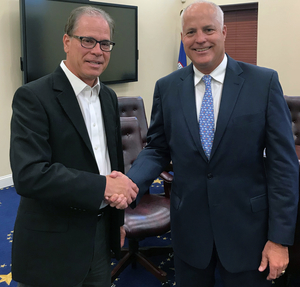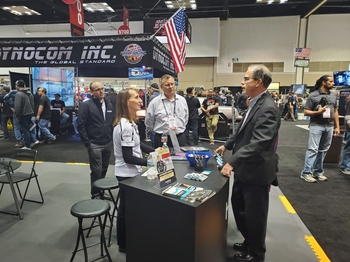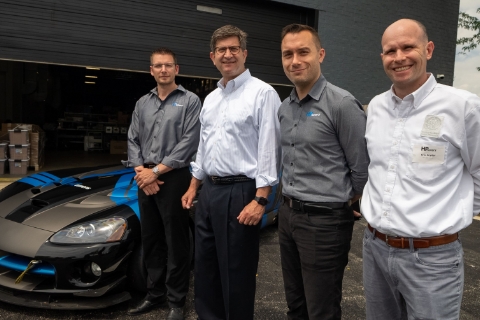SEMA News—September 2020
FROM THE HILL
SEMA News Goes Behind the Scenes With U.S. Senator Mike Braun
 Sen. Mike Braun (center), his wife Maureen, and SEMA President and CEO Chris Kersting (right) toured the PRI Trade Show. |
While many lawmakers spend their entire adult lives in government, U.S. Senator Mike Braun (R-IN) chose a different path, entering public service after spending more than three decades working in the automotive aftermarket. His experience in the industry and in dealing with government regulations shaped his views on a range of issues, which is why Sen. Braun is using his platform to make government friendlier to small businesses, taxpayers and automotive enthusiasts.
The past two and half years have been a rollercoaster ride for Sen. Braun, who went from being a long-shot candidate in the Republican primary for U.S Senate to a leading voice in Congress for everything from reforming healthcare to tackling the federal debt. Sen. Braun’s evenhanded approach to policymaking is refreshing, as he provides a much-needed perspective to Congress at a time when partisan grandstanding often overshadows the need to work with colleagues who have a different perspective on a given issue in order to build consensus. While Congress faces many impediments to addressing the most important issues of our time, Sen. Braun’s leadership in growing Meyer Distributing from a local small business into a national warehouse distributor and his role as community leader have helped prepare him to tackle the many challenges that our country faces.
A native Hoosier, Sen. Braun graduated from Jasper High School in 1972 in Jasper, Indiana. It was there that he took his first foray into politics, serving as senior class president. He went on to Wabash College in Crawfordsville, Indiana, where he graduated summa cum laude with an economics degree and served as president of the student body. In 1976, he married his high-school sweetheart, Maureen, and enrolled in Harvard Business School. After earning an MBA degree from Harvard in 1978, Braun took a different path from many of his classmates by choosing to move back to Indiana to start his career.
In 1979, he co-founded Crystal Farms Inc., which became one of the largest turkey operations in the Midwest. Just two years later, he started working for Meyer Body Co. and transitioned its business from manufacturing to distribution, forming Meyer Distributing. Over the following decades, Braun grew the business into a national distribution and logistics company.
While Braun is an automotive enthusiast, he is also a man of many hobbies. In his spare time, he enjoys hunting and fishing, riding ATVs, and forestry-related activities, including tree planting and timber-stand improvement.
In addition to his success in the aftermarket and passion for the automotive performance hobby, Sen. Braun has shown a steadfast commitment to helping in his community. As a former high-school football and basketball player, he used his experience on the field to coach youth sports. Braun also served on the Jasper School Board from 2004–2014, and the Indiana House of Representatives from 2015–2017.
When he stepped down from the Indiana State Legislature to run for U.S. Senate, Braun proved that he was not afraid to go all in. Given the importance of the decisions being made in the nation’s capital, Braun believed that Washington needed people with private sector experience to turn things around.
When he kicked off his campaign for U.S. Senate in 2017, political pundits favored then-U.S. Representatives Luke Messer (R-IN) or Todd Rokita (R-IN) to be the Republican nominee. However, Braun’s record of growing a small business helped to differentiate him from the career politicians in the race, and he won the May 2018 primary by more than 11%. He handily won the general election a few months later, defeating incumbent U.S. Senator Joe Donnelly (D-IN) by a margin of 53% to 43%. Braun’s hard-fought victory was integral in helping Republicans retain and grow their majority in the U.S. Senate.
Since arriving on Capitol Hill in January 2019, Sen. Braun developed a reputation as a pragmatist and someone who injects real-world experience into the public policymaking process. He is a member of the Senate Committees on Agriculture; Budget; Environment and Public Works; Health, Education, Labor & Pensions; and the Special Committee on Aging, and he is one of the strongest voices for small business in Congress.
As a result of his experience as president and CEO of Meyer Distributing, Sen. Braun understands the challenge that businesses face in providing quality healthcare to their employees. Sen. Braun has introduced a bill to require health insurers to disclose the rates they have negotiated and paid for each healthcare service provided to plan enrollees. He has championed legislation to accelerate a pathway for the U.S. Food and Drug Administration to approve drugs that are authorized to be marketed in other countries. Sen. Braun has also drafted common-sense proposals to prohibit members of Congress from being paid until both houses pass budget and appropriations bills for that fiscal year, which does not allow lawmakers to receive retroactive pay, and a bill to prohibit high-income individuals from receiving a federal tax credit for purchasing plug-in electric vehicles.
SEMA News recently had a chance to interview Sen. Braun and talk about everything from cars to political advocacy. Below are some highlights.
 SEMA PAC Chairman John Hotchkis (right) and Sen. Braun pose for a picture after a July 2019 meeting. |
SEMA News: What was your first car or truck?
Mike Braun: Let’s go back to 1970; it was a VW Super Beetle with a sunroof. When you like to fish and hunt like I do, and occasionally do outdoor projects, it may not have been the most practical car. I remember I had a dilemma one day. I had an extension ladder for a project and ended up having to stick it out of the sunroof. Back in that age, I don’t think I bothered to put a red flag on it. It really wasn’t a practical vehicle. Soon after that, I owned a ’72 Dodge Charger that I had for several years. It was brown and had a white vinyl top along with a shift on the console and an eight-track tape player. I quickly transitioned into pickups.
SN: How did you take Meyer from a small company to a leading distributor?
MB: In the original business, we had a sideline market where we bought and sold used trucks. Most of the market was farmers. I started in ’81, and that was the year of the farm crisis, so we quickly had to do something else. That’s when I started dabbling in truck accessories. We were a rural dealer. Stand-up bug shields and rollbars were a big deal. Drop-in bedliners had just started, and step bumpers were a big deal, since most pickup trucks came without them. The business was hitting its stride until the ’88 GM came out and they packaged bumpers into the truck. It didn’t take long before Ford and Dodge followed suit.
The business started as an installation facility, and we morphed into a distribution company. That’s when we moved into the first real warehouse, where my office is still tucked into a corner. The warehouse was 25,000 sq. ft. Prior to that, we had stuff stashed in the rafters. We didn’t have a loading dock for 17 years. It was the most hardscrabble of a beginning, and to think of where the industry is today—we’re an amazing industry of entrepreneurs who started businesses that create products that are so broad and so great.
My first office was in a mobile home. When I first came to D.C. about a year ago, they introduced me and said, “When this guy started his business, his office was in a double-wide.” I said, “I want to correct you. It was actually a single-wide.” That humble start turned into 70 locations and 46 states, and Meyer is still running it like a large small business. That’s in the culture. Three of my four children run the business, along with a great young executive team. Many of our employees have been there since the beginning.
SN: What motivated you to run for elected office?
MB: During that long journey, I saw government was not being neutral—a barrier to doing business. As we increased our footprint across the country, there were some states that made it nearly impossible to operate. It was frustrating to hear the news reports about the decisions being made by our elected officials, and I grew tired of being an armchair politician. That’s when I decided to run for state representative back in 2013.
I served in the Indiana State Legislature through 2017. I also served on the local school board for 10 years before that. I wanted to give back and see if I had the temperament to do more. Then everything fell into place. I took on an unlikely task of running for U.S. Senate. It was harder, since the race was compacted into 15 months. When I declared my candidacy for Senate, I started at 1% in the first poll.
The government moves at a very different speed than the way things do for entrepreneurs. Sadly, the government up until a few years ago was doing things that hurt small business. The Trump administration has done an unbelievable job of getting some those regulations down to where they are a little more reasonable. There is a need for regulations, but it was in overdrive. That is part of what is at stake in the election that is coming up.
SN: You have spent some time with President Trump over the past two years on the campaign trail and in official meetings. What is it like to work with the president?
 Sen. Braun spoke with representatives from Hurco Companies Inc. at a recent PRI Trade Show. |
MB: What you see is what you get. I know it infuriates half the country and elates the other half. The difference is that so much of it gets portrayed through the media lens as we go through this great American crisis of the coronavirus. A lot of this would not have gone so quickly had there been someone more bureaucratic running things.
The president’s agility and thinking outside the box has made a difference. You don’t know how that’s going to be different from a business point of view until you go back to the way it was before. There were rules like Waters of the U.S. that the EPA had put into overdrive—and I’m a conservationist. I’m the first Republican to join the climate caucus. Trump came from the outside and thinks differently.
Congress hasn’t exactly been knocking it out of the park lately. No one seems to think that a $1 trillion deficit is a big deal. Before I started running, $100 billion was considered a big deficit. Things are going to come to a head up here. We weren’t supposed to be $26 trillion in debt until 2023/2024. I’m concerned that some lawmakers just shrug it off and think that there’s no end to what we can borrow simply because rates are very low. We’re the only reserve currency. All of that could change quickly.
Like most things that happen up here, it’ll be solved in a crisis, not preemptively. That’s what I’m here to do during my time in the Senate—speak truthfully about it while most put it off till tomorrow.
SN: What advice do you have for automotive enthusiasts who want to make their voices heard in the public policy arena?
MB: Do what I did. Get off the couch and stop complaining at whatever level, whether it is local government, state government or Congress. I want everybody to stay engaged. If you don’t speak up, if you don’t talk about the enterprise that’s so intertwined with SEMA in other sectors of the economy, you will have bureaucrats creating regulations that dominate the landscape. That’s what evolved over the last few decades, regardless of whether it’s Republicans or Democrats running things. No other entities run an operation in that fashion. Get involved.
SN: What are the most important public policy issues where you believe there is a real chance for Congress to come together and enact meaningful legislation?
MB: When I got here, we were in the middle of a government shutdown. We got through that, and we actually did some committee work on reforming healthcare. That’s still the number-one issue out there, and it’s only been exacerbated by the coronavirus, but we do not have a transparent competitive system.
Most Republicans defend a broken industry. Democrats want more government involved. There were 80 senators who came forward with ideas as to what to do. It’ll still be the number-one issue, whether it’s tackled this year or next year. What are the chances of the Hatfields and McCoys getting together? For healthcare, everyone believes that it needs to be fixed, but it’s a question of how we go about doing it.
The climate is going to be the biggest long-term issue for younger generations. It has a direct impact on our industry, because some of the rules that impact auto parts have a climate component. Republicans have been foot-draggers on the climate discussion, whereas most of the industry that has businesses with a stake in climate are actively willing and wanting to be proactive and preemptive. We have not caught up to that in the Republican conference. The Democrats are on board, but they espouse heavy regulations that are too draconian. There’s a lot of lower-hanging fruit where I think we can work together.







